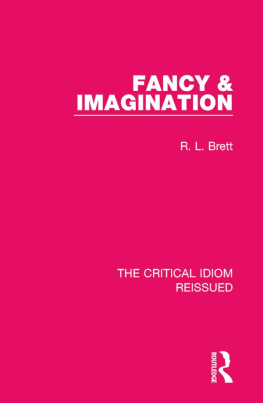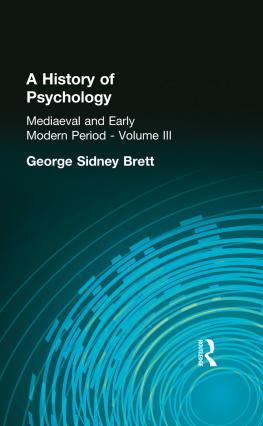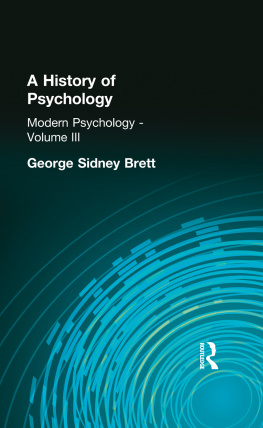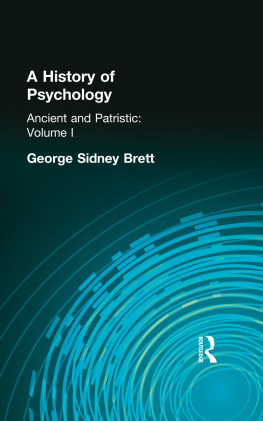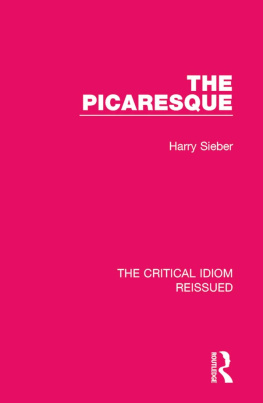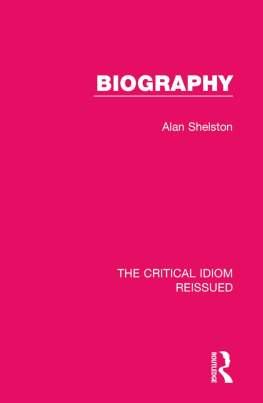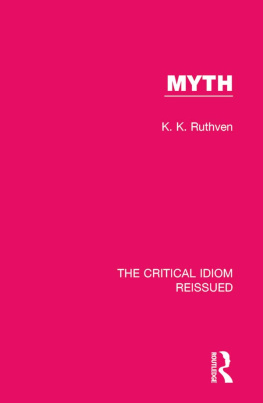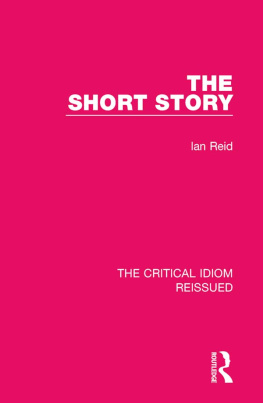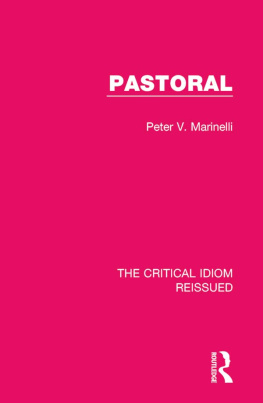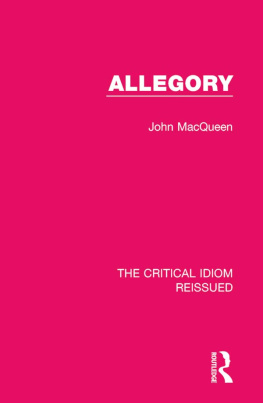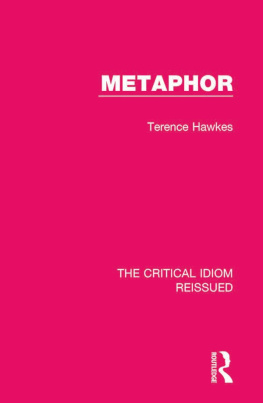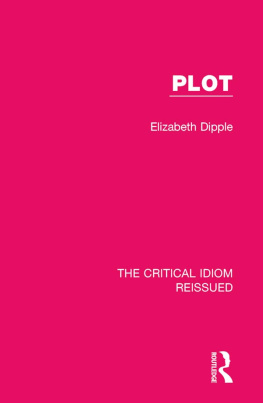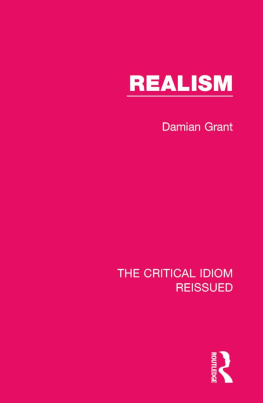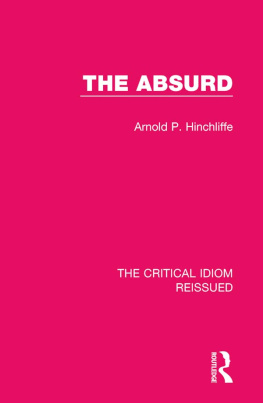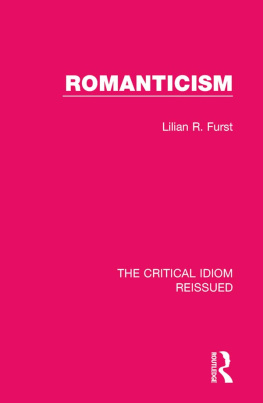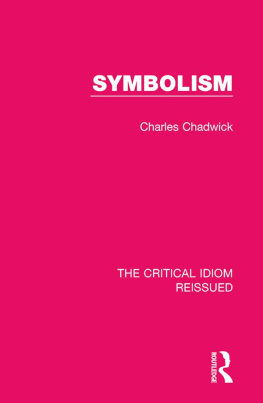Table of Contents
Guide
Print Page Numbers
THE CRITICAL IDIOM REISSUED
Volume 5
FANCY & IMAGINATION
FANCY & IMAGINATION
R. L. BRETT
First published in 1969 by Methuen & Co Ltd
This edition first published in 2018
by Routledge
2 Park Square, Milton Park, Abingdon, Oxon OX14 4RN
and by Routledge
711 Third Avenue, New York, NY 10017
Routledge is an imprint of the Taylor & Francis Group, an informa business
1969 R. L. Brett
All rights reserved. No part of this book may be reprinted or reproduced or utilised in any form or by any electronic, mechanical, or other means, now known or hereafter invented, including photocopying and recording, or in any information storage or retrieval system, without permission in writing from the publishers.
Trademark notice: Product or corporate names may be trademarks or registered trademarks, and are used only for identification and explanation without intent to infringe.
British Library Cataloguing in Publication Data
A catalogue record for this book is available from the British Library
ISBN: 978-1-138-21971-7 (Set)
ISBN: 978-1-315-26975-7 (Set) (ebk)
ISBN: 978-1-138-24189-3 (Volume 5) (hbk)
ISBN: 978-1-315-11561-0 (Volume 5) (ebk)
Publishers Note
The publisher has gone to great lengths to ensure the quality of this reprint but points out that some imperfections in the original copies may be apparent.
Disclaimer
The publisher has made every effort to trace copyright holders and would welcome correspondence from those they have been unable to trace.
Fancy & Imagination
R. L. Brett
First published 1969
by Methuen & Co Ltd 11 New Fetter Lane London EC4
Reprinted 1973
1969 R. L. Brett
SBN 416 15810 2 Hardback
SBN 416 15820 X Paperback
This title is available in both hard and paperback editions. The paperback edition is sold subject to the condition that it shall not, by way of trade or otherwise, be lent, re-sold, hired out, or otherwise circulated without the publishers prior consent in any form of binding or cover other than that in which it is published and without a similar condition including this condition being imposed on the subsequent purchaser.
Distributed in the USA. by
HARPER & ROW PUBLISHERS INC.
BARNES & NOBLE IMPORT DIVISION
Contents
This volume is one of a series of short studies, each dealing with a single key item, or a group of two or three key items, in our critical vocabulary. The purpose of the series differs from that served by the standard glossaries of literary terms. Many terms are adequately defined for the needs of students by the brief entries in these glossaries, and such terms will not be the subjects of studies in the present series. But there are other terms which cannot be made familiar by means of compact definitions. Students need to grow accustomed to them through simple and straightforward but reasonably full discussions of them. The purpose of this series is to provide such discussions.
Some of the terms in question refer to literary movements (e.g. Romanticism, Aestheticism, etc.), others to literary kinds (e.g. Comedy, Epic, etc.), and still others to stylistic features (e.g. Irony, The Conceit, etc.). Because of this diversity of subject-matter, no attempt has been made to impose a uniform pattern upon the studies. But all authors have tried to provide as full illustrative quotation as possible, to make reference whenever appropriate to more than one literature, and to compose their studies in such a way as to guide readers towards the short bibliographies in which they have made suggestions for further reading.
John D. Jump
University of Manchester
The terms fancy and imagination are generally associated with the name of Coleridge, especially when they are distinguished from or contrasted with each other. But, of course, they were both used before Coleridge and to understand the precise meanings he attached to them and the distinction he drew between them, it is necessary to look at the history of critical theory. The two terms belong to the various attempts which have been made to explain a work of art by reference to the mental processes involved in artistic creation and, when applied to works of literature, are related to what we call composition. Some critics have held that such accounts of how a work is produced cannot help us to judge its literary merit; or to put their point in more philosophical language, a genetic account has no reference to value. Coleridge believed otherwise, but we must leave this question for later discussion.
It is often said that Aristotle, the first great thinker to concern himself with literary criticism, was not interested in the psychology of composition. There is some truth in this, for Aristotle approached literature from the viewpoint of someone trained in the sciences: with an interest in the object before him rather than in the author. He looked at Greek tragedy as a biologist might look at an organism; something subject to growth and decay, but seen in essence at its maturest, when its growth had fully developed and decay had not yet started. This is why he chose to examine the tragedies of the great classical period of Greek drama and the work of writers such as Sophocles and Euripides. Here, if anywhere, would be found the real nature of tragedy, its structure and its organizing principles. His concern was with tragedy as a species, not with the authors struggle to express himself.
But Aristotle did give some account of the origin of art and as a biologist he described this in scientific terms. Earlier writers such as Homer had associated art with mythology; the poet was inspired by the Muse, who was, significantly, the daughter of memory. This enshrined the belief not only that the imagination was nourished by the images stored in a poets memory, but also that the poet embodied the tribal memory, that he kept alive in the hearts and minds of his contemporaries the feats of valour, the achievements and tribulations of the past, and transmitted these to future generations. Centuries later, Plato had compared the poetic inspiration to magnetism. As a magnet holds iron rings together by an invisible force, so the Muse binds together the poet and his audience by some mysterious attraction. Poetry, for Plato, was not an art or craft which could be learned; it was a kind of divine ecstasy. The poet, he writes in his Ion,
is a light and winged and holy thing, and there is no invention in him until he has been inspired and is out of his senses, and the mind is no longer in him.
(Trans. B. Jowett.)

